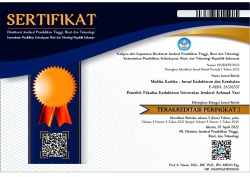MANFAAT VITAMIN D PADA DEMENSIA ALZHEIMER
Abstract
Demensia Alzheimer adalah bentuk demensia yang paling umum dan berkontribusi pada 60-70% kasus, serta merupakan kelainan neurodegeneratif ireversibel yang mengakibatkan penurunan fungsi kognitif secara progresif. Kekurangan vitamin D juga berhubungan dengan penyakit neurodegeneratif seperti demensia Alzheimer. Vitamin D juga telah terbukti dapat memperbaiki gambaran neuropatologis, serta berkontribusi terhadap prognosis yang lebih baik. Artikel ini bertujuan untuk memberikan gambaran tentang manfaat vitamin D pada demensia Alzheimer. Artikel ini bersifat studi literatur dengan sumber data berasal dari jurnal internasional berbahasa Inggris yang pencariannya melalui database pada PubMed, ScienceDirect, Wiley, dan Google Scholar. Berdasarkan temuan, terbukti bahwa vitamin D memberikan manfaat pada penderita demensia Alzheimer. Vitamin D memiliki efek perlindungan yang berkaitan dengan regulasi faktor neurotropik, transmisi saraf, homeostasis kalsium, modulasi proses imun dan inflamasi, proses vaskular dan stres oksidatif, serta dampak langsung pada amiloidogenesis. Pada akhirnya akan meningkatkan fungsi kognitif penderita demensia Alzheimer sehingga vitamin D dapat dipertimbangkan sebagai salah satu pengobatan penunjang pada demensia Alzheimer.
Kata kunci: ꞵ amiloid, demensia Alzheimer, neuroinflamasi, stres oksidatif, vitamin D
References
2. Kumar S, Chandnani A, Aung NH, Shahid S, Bukhari D, Shahzad S, et al. Alzheimer’s Disease and Its Association with Bone Health: A Case-Control Study. Cureus. 2021;13(3):1–4.
3. Alzheimer’s Disease International. Dementia fact sheet. 2023. p. 1–1.
4. Nitsa A, Toutouza M, Machairas N, Mariolis A, Philippou A, Koutsilieris M. Vitamin D in Cardiovascular Disease. In Vivo (Brooklyn). 2018;32(5):977–81.
5. Banerjee A, Khemka VK, Ganguly A, Roy D, Ganguly U, Chakrabarti S. Vitamin D and Alzheimer’s Disease: Neurocognition to Therapeutics. Int J Alzheimers Dis. 2015:1–12.
6. Gil Á, Plaza-Diaz J, Mesa MD. Vitamin D: Classic and Novel Actions. Ann Nutr Metab. 2018;72(2):87–95.
7. Wang W, Li Y, Meng X. Vitamin D and neurodegenerative diseases. Heliyon. 2023;9(1):1–16.
8. Alzheimer’s Association. 2023 Alzheimer’s disease facts and figures. Alzheimer’s Dement. 2023;19(4):1598–695.
9. George EK, Reddy PH. Can Healthy Diets, Regular Exercise, and Better Lifestyle Delay the Progression of Dementia in Elderly Individuals? J Alzheimers Dis. 2019;72(s1):S37–58.
10. Sehar U, Rawat P, Reddy AP, Kopel J, Reddy PH. Amyloid Beta in Aging and Alzheimer’s Disease. Int J Mol Sci. 2022;23(21):1–25.
11. Goedert M. Alzheimer’s and Parkinson’s diseases: The prion concept in relation to assembled Aβ, tau, and α-synuclein. Science (1979). 2015;349(6248):601–12.
12. John A, Reddy PH. Synaptic Basis of Alzheimer’s Disease: Focus on Synaptic Amyloid Beta, P-Tau and Mitochondria. Ageing Res Rev. 2021;65:1–35.
13. Xie J, Van Hoecke L, Vandenbroucke RE. The Impact of Systemic Inflammation on Alzheimer’s Disease Pathology. Front Immunol. 2022;12:1–18.
14. Agrawal I, Jha S. Mitochondrial Dysfunction and Alzheimer’s Disease: Role of Microglia. Front Aging Neurosci. 2020;12(252):1–8.
15. Kinney JW, Bemiller SM, Murtishaw AS, Leisgang AM, Salazar AM, Lamb BT. Inflammation as a central mechanism in Alzheimer’s disease. Alzheimers Dement. 2018;4:575–90.
16. Dorey E, Chang N, Liu QY, Yang Z, Zhang W. Apolipoprotein E, amyloid-beta, and neuroinflammation in Alzheimer’s disease. Neurosci Bull. 2014;30(2):317–30.
17. Reiss AB, Gulkarov S, Jacob B, Srivastava A, Pinkhasov A, Gomolin IH, et al. Mitochondria in Alzheimer’s Disease Pathogenesis. Life. 2024;14(2):1–21.
18. Huang WJ, Zhang X, Chen WW. Role of oxidative stress in Alzheimer’s disease. Biomed Rep. 2016;4(5):519–22.
19. Wang W, Zhao F, Ma X, Perry G, Zhu X. Mitochondria dysfunction in the pathogenesis of Alzheimer’s disease: recent advances. Mol Neurodegener. 2020;15(30):1–22.
20. Subramanian J, Savage JC, Tremblay MÈ. Synaptic Loss in Alzheimer’s Disease: Mechanistic Insights Provided by Two-Photon in vivo Imaging of Transgenic Mouse Models. Front Cell Neurosci. 2020;14:1–13.
21. Kurucu H, Colom-Cadena M, Davies C, Wilkins L, King D, Rose J, et al. Inhibitory synapse loss and accumulation of amyloid beta in inhibitory presynaptic terminals in Alzheimer’s disease. Eur J Neurol. 2022;29(5):1311–23.
22. Hooshmand B, Lökk J, Solomon A, Mangialasche F, Miralbell J, Spulber G, et al. Vitamin D in Relation to Cognitive Impairment, Cerebrospinal Fluid Biomarkers, and Brain Volumes. J Gerontol A Biol Sci Med Sci. 2014;69(9):1132–8.
23. Bikle DD. Vitamin D Metabolism, Mechanism of Action, and Clinical Applications. Chem Biol. 2014;21(3):319–29.
24. Jorde R, Mathiesen EB, Rogne S, Wilsgaard T, Kjærgaard M, Grimnes G, et al. Vitamin D and cognitive function: The Tromsø Study. J Neurol Sci. 2015;355(1–2):155–61.
25. Al-Amin M, Bradford DK, Sullivan RKP, Kurniawan ND, Moon Y, Han SH, et al. Vitamin D deficiency is associated with reduced hippocampal volume and disrupted structural connectivity in patients with mild cognitive impairment. Hum Brain Mapp. 2019;40(2):394–406.
26. Holick MF. Vitamin D and brain health: the need for vitamin D supplementation and sensible sun exposure. J Intern Med. 2015;277(1):90–3.
27. Chai B, Gao F, Wu R, Dong T, Gu C, Lin Q, et al. Vitamin D deficiency as a risk factor for dementia and Alzheimer’s disease: an updated meta-analysis. BMC Neurol. 2019;19(1):1–11.
28. Gáll Z, Székely O. Role of Vitamin D in Cognitive Dysfunction: New Molecular Concepts and Discrepancies between Animal and Human Findings. Nutrients. 2021;13(11):1–24.
29. Karakis I, Pase MP, Beiser A, Booth SL, Jacques PF, Rogers G, et al. Association of Serum Vitamin D with the Risk of Incident Dementia and Subclinical Indices of Brain Aging: The Framingham Heart Study. J Alzheimers Dis. 2016;51(2):451–61.
30. Łukaszyk E, Bień-Barkowska K, Bień B. Cognitive Functioning of Geriatric Patients: Is Hypovitaminosis D the Next Marker of Cognitive Dysfunction and Dementia? Nutrients. 2018;10(8):1–14.
31. Moretti R, Morelli ME, Caruso P. Vitamin D in Neurological Diseases: A Rationale for a Pathogenic Impact. Int J Mol Sci. 2018;19(8):1–27.
32. Laughlin GA, Kritz-Silverstein D, Bergstrom J, Reas ET, Jassal SK, Barrett-Connor E, et al. Vitamin D Insufficiency and Cognitive Function Trajectories in Older Adults: The Rancho Bernardo Study. J Alzheimers Dis. 2017;58(3):871–83.
33. Berridge MJ. Vitamin D, reactive oxygen species and calcium signalling in ageing and disease. Philos Trans R Soc Lond B Biol Sci. 2016;371(1700):1–11.



























